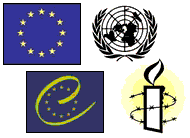The Beginners Guide to Human Geography
Created | Updated Dec 12, 2002
Contrary to popular belief, Geography is much more than just colouring in maps, or answering Anne Robinson on the Weakest Link 'Through which city does the River Tiber run?'1 Geography can be loosely divided into two main disciplines, physical and human geography. Physical geography is arguably more scientific in nature, concerning itself with the world around itself, and how it works. This can include how rivers work, why volcanoes occur where they do, or the weather of an area.Human geography, on the other hand, is the interaction between humanity and the land, or 'studying the character of the earth's surface in relation to humankind'2 It tries to meet the needs of humanity. In this way, human geography can be seen as much more diverse and far-reaching than physical geography. It includes the placement of retail outlets in a particular area, addressing famine, or the impact of the Olympics on the local population. The focus of human geography is on people, though not to be confused with sociology, as sociology is about how people behave with one another, and describing how society functions. Human Geography tries to make society function in the best way possible.
Human Geography can be sub-divided loosely into categories:
Development
 Human Development is defined by the UN as "about creating an environment in which people can develop their full potential and lead productive, creative lives in accord with their needs and interests." Therefore, Development is no longer about economic development and gaining more money, but a much more holistic term encompassing social, economic and environmental factors. The latest development in this field is 'sustainable development'. Sustainable development was first mentioned in the Brundtland Commission, which occured in 1987. This defined it as "development that meets the needs of the present, without compromising the ability of future generations to meet their own needs." Therefore, sustainable development is that which does not place the World in such a condition that future generations will not be able to live their lives. The problem with addressing this, however is that many people prefer to see short-term solutions, rather than longer-term solutions that extend beyond their own life-times.
Human Development is defined by the UN as "about creating an environment in which people can develop their full potential and lead productive, creative lives in accord with their needs and interests." Therefore, Development is no longer about economic development and gaining more money, but a much more holistic term encompassing social, economic and environmental factors. The latest development in this field is 'sustainable development'. Sustainable development was first mentioned in the Brundtland Commission, which occured in 1987. This defined it as "development that meets the needs of the present, without compromising the ability of future generations to meet their own needs." Therefore, sustainable development is that which does not place the World in such a condition that future generations will not be able to live their lives. The problem with addressing this, however is that many people prefer to see short-term solutions, rather than longer-term solutions that extend beyond their own life-times.
Population
Population is about gaining a balance between resources and people. It takes a number of viewpoints, varying from the point of the population in question, and what they need such as a hospital or an MP, to the point of the service providers, whose problems include 'where should I place this new supermarket for optimum profit?This has global significance because there is a limited amount of resources, yet there appears to be unchecked population growth. One of the first people to concern themselves with this was Thomas Malthus in the eighteenth century. Malthus presented the hypothesis that unrestricted population growth would always exceed growth in resources. This is because the population grows geometrically [2, 4, 8, 16], but resources, he supposed,grow arithmetically [1, 2, 3, 4]. Malthus therefore concluded that there was a limit to the population, and when this was reached, limiting factors, such as wars, famines etc. would stabilise the population.
Population extends beyond this, however to the study of population, or demography itself. This is how population is structured and where they are distributed in a set area, whether it is age, gender, wealth or whatever. This tool can be implemented by many different parties, supermarkets, for example use the data given from reward cards to work out what special offers appear in that area. The Postal System uses similar data to know which flyers to put through your door. This is probably the most valuble data for industry, but can also be used in fields such as poverty reduction, in making the links between deprivation and health, or identifying deprived areas.
Globalisation
Globalisation has been described as 'the most powerful trend of our time'.3 Ruud Lubbers, a Dutch academic, defines Globalisation as 'a process in which geographic distance becomes a factor of diminishing importance'. It permeates all levels, including economics, culture, politics and societies, and in some way bringing them closer together. It is not, however a recent occurance. Globalisation, in some way, has been occuring for centuries, dating back from when Walter Raleigh brought back potatoes from the 'New World'. This also accounts for why it is possible to get strawberries all year round. Economically, globalisation can be seen as the increasing interaction of national economic systems. This has gathered pace in the past century with the rise of TNCs 4, who are now based in more than one country and are thus less affected by the individual economies of the countries they inhabit. This has reached such an extent that if TNCs were included in the top 100 economies of the world, only half would be actual countries: 50% of them would be TNCs. The problem arises when TNCs have a larger economy than some less developed countries, yet are not as accountable for their actions as countries, because they have no electorate to please.5
Economically, globalisation can be seen as the increasing interaction of national economic systems. This has gathered pace in the past century with the rise of TNCs 4, who are now based in more than one country and are thus less affected by the individual economies of the countries they inhabit. This has reached such an extent that if TNCs were included in the top 100 economies of the world, only half would be actual countries: 50% of them would be TNCs. The problem arises when TNCs have a larger economy than some less developed countries, yet are not as accountable for their actions as countries, because they have no electorate to please.5
This has also had cultural and social implications. With the spread of TNCs, there has been the spread of corresponding values. As globalisation is a mainly capitalist trend, so the accompanying values are as well. Some people have criticised this as a monoculture, or 'McDonaldisation'. Children have trouble making ends meet, earning money from scavenging in rubbish, saving for money to buy from McDonalds rather than locally grown produce which may be better for them.
Globalisation is only described briefly, as it could have several guide entries of it's own!
Urban/Rural Landscapes
Urban areas have been on the increase since the Industrial Revolution. Currently, the urban population is growing at four times the rate of the rural population.6 From 1990 to 2025, it has been predicted that the urban population will double to almost 5 billion: ninety percent of which will occur in developing countries. This has led to the creation of 'megacities'7 In 1950, there were only two megacities in the world [being New York and London], which rose to 23 in 1995, and is predicted to be 36 in 2015: 23 of which are predicted to be in Asia. At current pace and scale, over 60 million people are added to urban environments each year.
This presents great challenges to the international community. Food is an increasingly valuble commodity, as more and more is consumed in the developed world [or economic 'North'], yet the developing world is increasing at a lot faster rate. Food is grown in rural conditions, so if rural areas are declining, then how are we going to feed our growing population? This illustrates how areas in human geography merge: using various skills for the best outcome.
Many development agencies, governmental organisations, and the like are now scrabbling to try to conserve rural areas, and try to bring many areas out of various degrees of poverty and deprivation. They have now recognised that it is important to conserve a degree of equilibrium between rural and urban areas.
This is also important within urban areas. Many urban areas are undergoing some sort of decline: whether it be in inner cities in more developed countries, or in slum districts in the outskirts. This leaves governmental agencies and the like with a problem. With those who have the resources, it is very possible to turn this decline around. Classic examples of this include Canary Wharf in London and parts of Liverpool's Docks. However, this can only occur if the resources are available: which in many places they aren't. This means that many places are allowed to spiral further into decline.
The end is in sight...
That is a direct untruth made by this researcher, because this entry is only a drop in the sea that is human geography, or even geography as a whole. The common thread running through the whole subject, however is solving problems, and reconciling differences between the landscape, and the people that inhabit it. Some have described human geography as the way forward in terms of governing the world, though unfortunately this is (in the opinion of this Researcher) shockingly under-represented in the world today.
